(优选)新编英语教程unit.
(完整版)《新编英语教程》第3册的课文
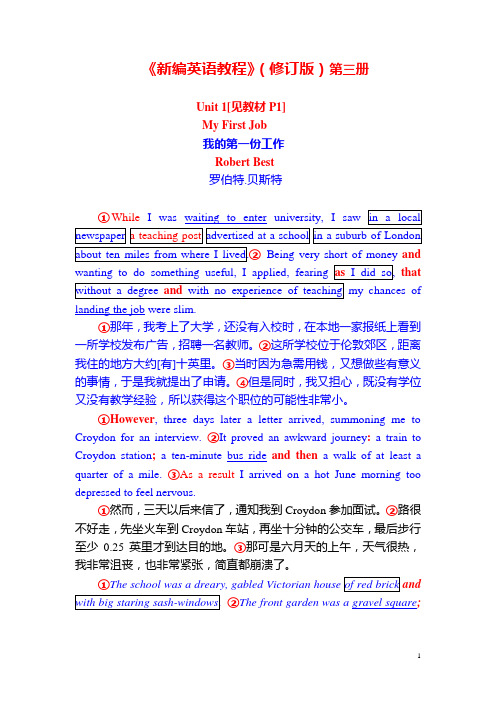
《新编英语教程》(修订版)第三册Unit 1[见教材P1]My First Job我的第一份工作Robert Best罗伯特.贝斯特①While I was waiting to enter university, I saw②Being very short of money andwanting to do something useful, I applied, fearing thatmy chances of landing the job were slim.①那年,我考上了大学,还没有入校时,在本地一家报纸上看到一所学校发布广告,招聘一名教师。
②这所学校位于伦敦郊区,距离我住的地方大约[有]十英里。
③当时因为急需用钱,又想做些有意义的事情,于是我就提出了申请。
④但是同时,我又担心,既没有学位又没有教学经验,所以获得这个职位的可能性非常小。
①However, three days later a letter arrived, summoning me to Croydon for an interview. ②It proved an awkward journey: a train to Croydon station;a ten-minute bus ride and then a walk of at least a quarter of a mile. ③As a result I arrived on a hot June morning too depressed to feel nervous.①然而,三天以后来信了,通知我到Croydon参加面试。
②路很不好走,先坐火车到Croydon车站,再坐十分钟的公交车,最后步行至少0.25英里才到达目的地。
③那可是六月天的上午,天气很热,我非常沮丧,也非常紧张,简直都崩溃了。
①and②The front garden was a gravel square;four evergreen shrubs stood at each corner, where they struggled to survive the dust and fumes from a busy main road.①学校是一幢维多利亚时代的红砖建筑,有山墙,有很大的垂直拉窗,闪闪发光,让人感觉单调乏味。
新编英语教程UNIT 1,12
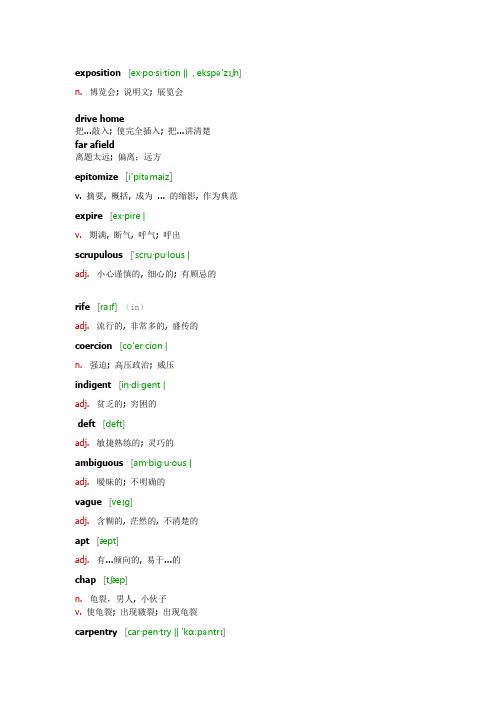
exposition[ex·po·si·tion || ‚ekspə'zɪʃn] n.博览会; 说明文; 展览会drive home把...敲入; 使完全插入; 把...讲清楚far afield离题太远; 偏离;远方epitomize [i'pitəmaiz]v. 摘要, 概括, 成为 ... 的缩影, 作为典范expire[ex·pire |v.期满, 断气, 呼气; 呼出scrupulous['scru·pu·lous |adj.小心谨慎的, 细心的; 有顾忌的rife[raɪf] (in)adj.流行的, 非常多的, 盛传的coercion[co'er·cion |n.强迫; 高压政治; 威压indigent[in·di·gent |adj.贫乏的; 穷困的deft[deft]adj.敏捷熟练的; 灵巧的ambiguous[am·big·u·ous |adj.暧昧的; 不明确的vague[veɪg]adj.含糊的, 茫然的, 不清楚的apt[æpt]adj.有...倾向的, 易于...的chap[tʃæp]n.龟裂,男人, 小伙子v.使龟裂; 出现皲裂; 出现龟裂carpentry[car·pen·try || 'kɑːpəntrɪ]n.木匠业; 木作品; 木工substitute[sub·sti·tute |v.代替; 替代, 取代n.代理, 代用品, 代理人opportunism[op·por·tun·ism |n.机会主义, 投机主义singularity[sin·gu·lar·i·ty |n.单一; 奇异; 异常malapropism[mal·a·prop·ism |n.词语误用; 用词错误可笑oddity[odd·i·ty |n.奇异, 奇特, 奇妙peculiarity[pe·cu·li·ar·i·ty |n.特质, 怪癖, 特性put in one’s place +sth 代之以…distillation[dis·til·la·tion |n.蒸馏; 蒸馏物; 净化; 精华distill 蒸馏;滴下;提取精华be alive to: realizealteration[al·ter·a·tion |n.变更, 改变, 修改; 变样delicate['del·icate |adj.细致优雅的, 美味的, 微妙的have some/no kinship with…有有血族关系ellipsis[el'lip·sis |n.省略; 省略符号shades of meaning/opinion有细微差别的意思/意见prolific[pro'lif·ic |adj.生子的, 多产的, 结果实的amateur[am·a·teur |n.业余从事者; 粗通的人; 外行; 爱好者adj.业余的; 外行的, 不熟练的detach[de·tach |v.分开; 分遣; 分离euphoric[eu'phor·ic |adj.心情愉快的; 心满意足的schizophrenic[schiz·o·phren·ic |n.精神分裂症患者adj.精神分裂症的dreadful['dread·ful |adj.可怕的prune[pruːn]n.梅干; 傻瓜; 乏味的人, 讨厌的人; 深紫红色v.整枝; 减少; 删除; 修剪, 修整; 删除; 剪去, 剪除; 削减constructivelyadv.建设性地spontaneity[spon·ta·ne·i·ty |n.自发性; 自然发生craftman 工匠师傅virtuous[vir·tu·ous |adj.善良的, 贞洁的, 有道德的simultaneous[si·mul·ta·ne·ous |adj.同时的, 同时发生的sequence[se·quence |n.序列, 顺序, 继起的事construct[con·struct |n.构思的结果, 构想; 概念v.建造; 创立; 构造vehicle[ve·hi·cle |n.交通工具, 传达媒介, 车辆genre[gen·re |n.类型; 流派dimension[di·men·sion |n.尺寸, 容积, 次元immense[im·mense |adj.极广大的; 非常好的; 无边的tedious[te·di·ous |adj.冗长乏味的; 使人厌烦的triple[tri·ple |v.使成三倍, 三倍于; 增至三倍adj.三倍的; 由三部分构成的; 三重的; 三方的quadruple['quad·ru·ple || 'kwɑdruːpl /'kwɒd-] n.四倍数v.使成四倍; 成为四倍adj.四倍的, 四部组成的, 四重的denotation[de·no·ta·tion |n.指示;外延意义;外延;字面意思unit 12anthropology[an·thro·pol·o·gy |n.人类学mating[mat·ing |n.交配; 婚姻; 相配mate[meɪt]n.同伴, 伙伴; 配偶; 老兄, 老弟; 动物的配偶v.使交配; 使配对; 成伙伴; 紧密配合, 交配gamut[gam·ut |n.全音阶; 全音域; 长音阶evolve[e·volve |v.使发展, 使进化, 推论; 进展, 展开, 进化aberrant[æbərənt]adj.脱离正道的, 变体的, 脱离常轨的manifest[man·i·fest |n.载货单; 旅客名单v.表明, 证明, 表现adj.显然的; 明白的probe[prəʊb]n.探针, 探测针, 调查v.用探针测, 详细调查; 探测; 调查; 查究philosophical probings 哲学探索pristine[pris·tine |adj.原来的, 原始的, 古时的vernacular[ver·nac·u·lar |n.本地话, 方言adj.地方的, 用地方语写成的autonomous[au·ton·o·mous |adj.自治的; 自主的; 自治权的; 独立存在的autonomouslyadv.自治地; 独立自主地incumbent[in'cum·bent |n.现任者, 在职者; 领圣俸者; 教区牧师adj.凭依的, 负有义务的, 依靠的preliminary[pre·lim·i·nar·y |adj.初步的, 预备的, 开始的cactus[cac·tus | --cacti (pl.)n.仙人掌nebula(e)[neb·u·la |n.星云, 云翳variant['var·i·ant |n.变体, 异体primitive[prim·i·tive |n.原始人, 早期艺术家adj.原始的, 旧式的, 上古的barbarian[bar·bar·i·an |n.粗鲁无礼的人; 野蛮人adj.野蛮的; 粗鲁的pagan[pa·gan |n.异教徒, 无宗教信仰者adj.异教的; 不信教的; 非基督教的sway[sweɪ]n.摇动, 摇摆; 统治; 支配; 影响v.摇摆; 动摇;倾斜; 转向; 影响sophistication[so·phis·ti·ca·tion | n.老于世故; 复杂; 有教养; 精密。
新编英语教程2Unit
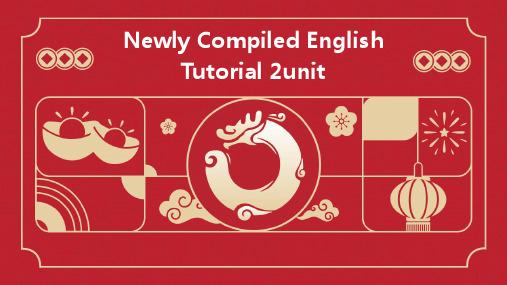
Theme background
Main topics covered
The unit covers a range of main topics within the theme, including language development, cultural understanding, and problem-solving skills.
Speaking Games
Fun speaking games such as "Simon Says" or "20 Questions" are used to encourage students to speak more freely and creatively in English, while also improving their listening comprehension skills.
Words and expressions
语法解析
文章中的语法结构较为简单,但仍然包含了一些重要的语法点,如动词时态、名词单复数形式等。通过分析这些语法结构,学习者可以更好地理解英语句子的构成和含义。
Grammar parsing
句子分析
文章中的句子类型多样,包括简单句、复合句和并列句等。通过分析这些句子,学习者可以更好地理解英语句子的逻辑关系和语义重点。同时,文章中的句子结构也较为规范,没有出现过多的复杂句式和长难句。
Theme objectives
02
Text Analysis
CHAPTER
文本概览
本单元的文本是一篇关于英语学习的文章,主要介绍了学习英语的方法和技巧。文章结构清晰,分为几个段落,每个段落都有明确的主题。
新编英语教程unit1,2,3,4,5,8,9,10,11课文翻译
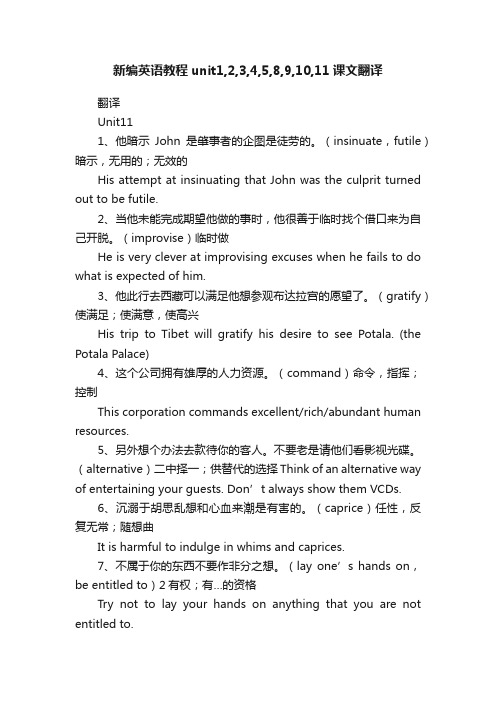
新编英语教程unit1,2,3,4,5,8,9,10,11课文翻译翻译Unit111、他暗示John是肇事者的企图是徒劳的。
(insinuate,futile)暗示,无用的;无效的His attempt at insinuating that John was the culprit turned out to be futile.2、当他未能完成期望他做的事时,他很善于临时找个借口来为自己开脱。
(improvise)临时做He is very clever at improvising excuses when he fails to do what is expected of him.3、他此行去西藏可以满足他想参观布达拉宫的愿望了。
(gratify)使满足;使满意,使高兴His trip to Tibet will gratify his desire to see Potala. (the Potala Palace)4、这个公司拥有雄厚的人力资源。
(command)命令,指挥;控制This corporation commands excellent/rich/abundant human resources.5、另外想个办法去款待你的客人。
不要老是请他们看影视光碟。
(alternative)二中择一;供替代的选择Think of an alternative way of entertaining your guests. Don’t always show them VCDs.6、沉溺于胡思乱想和心血来潮是有害的。
(caprice)任性,反复无常;随想曲It is harmful to indulge in whims and caprices.7、不属于你的东西不要作非分之想。
(lay one’s hands on,be entitled to)2有权;有…的资格Try not to lay your hands on anything that you are not entitled to.8、他没有来参加竞赛。
新编英语教程unit3
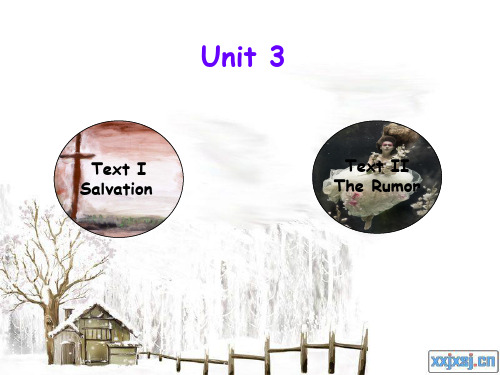
Please answer the following questions after reading.
1.What did his aunt say to the child about salvation and what effect did the description of salvation have on him?
preach– give a religious talk, usually as part of a service in church. There are obvious discrepancies between what you practice and what you preach.
gula (gluttony) 贪食
avaritia (greed) 贪婪 socordia (sloth) 懒惰 ira (wrath) 愤怒 invidia (envy) 嫉妒
superbia (pride) 傲慢
Salvation religions are typically founded by a prophet or religious leader who creates a basic doctrine which explains to people how salvation might be achieved. The legitimacy and long-term authority of these prophets is often dependent upon possessing a high degree of personal charisma and, sometimes, the ability to work miracles presumably a sign of divine favor and sanction.
新编英语教程第一册Unit01

Unit 1DIALOGUE IBack from the Summer CampA: You know what? I've just come back from a wonderful summer camp.B: You have? Where did you go?A: Mount Tai.B: I've been there too. It's one of China's most beautiful mountains. There're many scenic spots and places of historical interest. I was greatly impressed by its natural beauty when I took a study tour there two years ago.A: It really is a very beautiful tourist attraction. But we went there as campers, not as tourists. It was a study programme organized by our local community committee.B: I bet you had lots of fun there.A: Yes, it was a wonderful experience. You know it was the first time I'd been to a summer camp in five years, and it brought back such sweet memories.B: Were there any other camping groups when you were there?A: Not when we arrived at the foot of the mountain. But soon we were joined by many similar camping groups from other cities. By the time we arrived at the campsite, night had fallen. And we were so happy to see that the campers who arrived there the day before were giving a performance by the campfire.B: You remind me of my last trip there. I wish I had been there with you this time. What did you do at the summer camp? A: Oh, lots of things. Most of the time we studied plants, rocks, insects... things like that. We also had lots of fun, hiking, climbing mountains, taking pictures...B: I guess you had the life of a natural scientist.A: And the life of an athlete, too.B: I had a similar experience during the summer two years ago. I remember my summer camp was subdivided into what we called "hobby groups", such as the music group, the drama group, and the model aircraft and ship group. People sharing similar interests and hobbies worked together. Were there any hobby groups in your programme?A: Yes, of course. We had a number of hobby groups for campers with varied interests. We called them "project groups" because each group worked on a particular project. At the completion of their projects, each group presented their "fruits" to all the campers. Some gave oral reports, some staged an exhibition, and others put on a performance.B: You had a marvellous time this summer! Your story has really brought back happy memories of my own camping experience.DIALOGUE IIDialogue:Sally Jones, an English language teacher from Oxford University, has just arrived at Beijing Airport. She is going to spend three months here, lecturing and teaching at different colleges and universities. Miss Wang, Secretary of the English Department, and Mr. Yu, Vice Chairman of the English Department, have come to the airport to meet her.Miss Wang: Excuse me, are you Miss Jones?Sally: Yes, that's right.Miss Wang: Oh, how do you do? I'm Wang Xinfu, Secretary of the English Department.Sally: Oh, yes, Miss Wang, hello. I'm very pleased to meet you. (They shake hands.)Miss Wang: Miss Jones, may I introduce you to Mr. Yu, Vice Chairman of the English Department?Mr. Yu: Hello, Miss Jones, I've been looking forward to meeting you.Sally: How do you do? (They shake hands.) It's very kind of you both to come and meet me at the airport.Miss Wang: Not at all. I hope you had a good flight.Sally: Well, not too bad. It was a bit bumpy as we came in to land; some low clouds, I think.Mr. Yu: Yes, we had a storm here yesterday and the weather is still a bit unsettled.Sally: Oh, dear! I was rather lucky then!Miss Wang: You must be rather tired after your long flight.Sally: Well, yes, I am actually... I've been travelling for 21 hours!Mr. Yu: In that case, I think we should go straight to the hotel.Miss Wang: Yes, I agree. This way then, ... if you'd like to follow me.READING IHerbert's HomecomingHerbert Marshall was a student at Cambridge, but his hometown was St. Albans. It was August and the family had gone to the seaside. Herbert went to France for his holiday, but he ran out of money, and came home a week earlier than he had expected to.His train didn't get into St. Albans until just before midnight. The last bus had gone, so he had to walk home. He let himself into the kitchen, and as he was feeling hot and sticky, he took off his shirt to have a wash.Suddenly he heard heavy footsteps running up the path. The back door burst open, and he found himself surrounded by policemen. They pushed him into the living-room next door, made him sit down, and began asking him question."What's your name?""Where do you live?""What's in that case?""What are you doing here?""I live here," said Herbert, "I've been on holiday." But nobody listened to him. They just went on asking questions. Then suddenly one of the policemen said:"Watch him, Frank — we'll go and search the house."They left a tall, very young policeman to guard him."Can I put my shirt on?" asked Herbert."No," said the policeman, "stay where you are."Then the others came back with an older man, a sergeant. He asked the same questions, but he listened to Herbert's answers."I live here," said Herbert, "and I want to put my shirt on." The sergeant looked at him thoughtfully."We'll soon settle this," he said.He went out and came back with a small, sandy-haired man wearing a shabby, brown dressing-gown. It was Herbert's next-door neighbour. He peered at Herbert intently through thick spectacles."Oh, yes, sergeant," he said, "that is Mr. Marshall." Then he disappeared very quickly. The policemen all looked dreadfully disappointed. They were convinced they had caught a burglar."Did he ring you up?" asked Herbert. The police sergeant nodded."He saw a light and understood your family had all gone away to the seaside."When they had all gone, Herbert made himself a cup of coffee.。
新编英语教程unit1,2,3,4,5,8,9,10,11Paraphrase
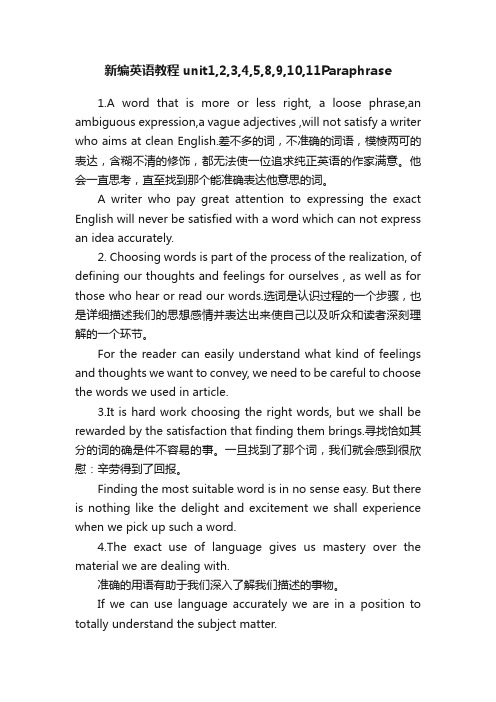
新编英语教程unit1,2,3,4,5,8,9,10,11Paraphrase1.A word that is more or less right, a loose phrase,an ambiguous expression,a vague adjectives ,will not satisfy a writer who aims at clean English.差不多的词,不准确的词语,模棱两可的表达,含糊不清的修饰,都无法使一位追求纯正英语的作家满意。
他会一直思考,直至找到那个能准确表达他意思的词。
A writer who pay great attention to expressing the exact English will never be satisfied with a word which can not express an idea accurately.2. Choosing words is part of the process of the realization, of defining our thoughts and feelings for ourselves , as well as for those who hear or read our words.选词是认识过程的一个步骤,也是详细描述我们的思想感情并表达出来使自己以及听众和读者深刻理解的一个环节。
For the reader can easily understand what kind of feelings and thoughts we want to convey, we need to be careful to choose the words we used in article.3.It is hard work choosing the right words, but we shall be rewarded by the satisfaction that finding them brings.寻找恰如其分的词的确是件不容易的事。
新编英语教程4unit

新编英语教程4U n i t1(总28页)--本页仅作为文档封面,使用时请直接删除即可----内页可以根据需求调整合适字体及大小--Unit One1.Movie ClipWatch the movie clip and answer the following questions.1.What is Ingrid’s first New Year’s resolution Did she accomplishit?2.Her first New Year’s resolution is to quit her job. Yes, she did.2.Why did Ingrid buy the man for the whole dayBecause she wanted him to help make her other New Year’sresolutions come true by midnight.Discussion:Why do New Year’s resolutions rarely work In your opinion, how can we succeed in achieving them?(This is an open question.)Script(From New Year’s Eve)- All right. Working on those resolutions, huh?- No.- Okay. I have a delivery here for Mr. Jonathan Cox.- Do you work here?- No. I work for a courier(快递员) service. I’ve been delivering packages to you for about, I don’t know, a year now. But I think this is maybe the first time you’ve ever looked me in the eye. How are you doing?- Sorry. That’s actually an old resolution. Make more eye contact. - So those were New Year’s resolutions, huh Looks like a long list. You gotta get on it.- I don’t know, maybe next year.- Whoa. Jeez! Are you serious That is a hot ticket.- Really- It’s amazing. They have the best food, the best music. They have so many single girls. And it’s a masquerade(化妆舞会), so youdon’t even have to worry about their faces. You kind of just, you know, use your imagination. If anybody tries to kick you out, or even asks who you are, you just straight-up lie. What are they gonna doIt’s brilliant. It’s like Facebook, but real.- I remember who you are now.- Right, exactly. Anyways, I would give my left... Well, maybe next year.- Ms. Withers Did you call in a delivery of something- Ingrid.- Ingrid.- And actually, I’m your next job. I bought you for the day.- Bought me for the day, huh Oh, Ms. Withers. I think I should be offended(得罪,冒犯), but I’m just too intrigued(好奇的,被迷住的).- My New Year’s resolutions. I just took care of the first one.- You quit your job All right.- If you can make the rest of these come true by midnight, you get these.- For me Holy shi... Whoa. Whoa, okay. Put these down. Put these down. Don’t flash those around. Everybody can see them. Seriously, You called the right guy. I’m in. Let me see No. Two. What is it Whew. Go to Bali. Breakfast at Tiffany’s. You wanna save a life. Are you kidding meIt’s physically impossible. I don’t understand what you’re talking about. All rightI don’t understand what you want me to do here.- Use your imagination.- We’re gonna need a bigger boat.- You know, you don’t have to sit like that. You can put your legs around me, or you can hold onto me.- No, I’m okay.- All right.- This is it. This is as close to the ball dropping as I can get you. Hey, good luck with that last one, all right?- No. I figured that was a long shot going in.- A long shot What are you talking about Going to Bali That was kindof a long shot.- Let’s get this out of here, okay?- Man, I don’t even know whose this is, bro. I’m just saying.- Thanks. Make a list of your own. Don’t wait as long as I did.- Pow, pow, shwing.- Thank you. Mm.- Goodbye.- Goodbye.- Have a great time.- You too. Happy new year, Ingrid.3.QuotesRead the following quotes and tell your classmates which one is your favorite. State your reasons.Sometimes we know the best thing to do, but fail to do it. Newyear’s resolutions are often like that. We make resolutions because we know it would be better for us to lose weight, or get fit, or spend more time with our children. The problem is that a resolutionis generally easier to break than it is to keep.— Peter SingerNo one’s ever achieved financial fitness with a January resolution that’s abandoned by February.— Suze OrmanI have no way of knowing how people really feel, but the vastmajority of those I meet couldn’t be nicer. Every once in a while someone barks at me. My New Year’s resolution is not to bark back.— Tucker CarlsonMy New Year’s Resolution List usually starts with the desire to lose between ten and three thousand pounds.— Nia VardalosIf you asked me for my New Year Resolution, it would be to find out who I am.— Cyril CusackMay all your troubles last as long as your New Year’s resolutions.— Joey AdamsI think in terms of the day’s resolutions, not the years’.— Henry MooreMaking resolutions is a cleansing ritual of self assessment and repentance that demands personal honesty and, ultimately, reinforces humility. Breaking them is part of the cycle.—Eric ZornI made no resolutions for the New Year. The habit of making plans, of criticizing, sanctioning and molding my life, is too much of a daily event for me.—Anaïs NinText I1.Pre-Reading QuestionsThe hero of the story, who is married and has four children, istalking about his New Year’s Resolution in the text. In the first paragraph, he says “This year it’s going to be different”. Whydoes he say soWhat sort of resolutions did he make in the previous yearsHow do his New Year’s resolutions for this year differ from previous onesMake a few guesses.For your reference:When a person makes New Year’s resolutions, he makes up his mind to do or not to do certain things in the coming year. Of course,different people make different New Year’s resolutions. For example, a student may decide to work harder at his studies and not go to the cinema so often; a teacher may decide to improve his/her teaching; a heavy smoker may decide to stop smoking altogether. Some people maybe able to carry out their New Year’s resolutions, but some may not. For most people, it’s often easier to make New Year’s resolutions than to carry them out.2.General ReadingYou are given five minutes to read the text rapidly once to get the main idea.Now decide which of the following statements best sums up the main idea. Put a tick by it.__ 1. Some of his family members were pleased while others were not when the writer tried to please everybody in the family on NewYear’s Day.__ 2. The writer tried to be a better husband and a better father in the new year, and his family members appreciated this.√ 3. The writer carried out his New Year’s resolutions faithfully to improve himself, but the results all went contrary to hisexpectations.Key(点击答案按钮,上述第三句前面横线上出现√)3.Background Notes(1) escapement(卡子,擒纵机)An escapement is a device in mechanical watches and clocks that transfers energy to the timekeeping element and allows the number of its oscillations(振荡,振动) to be counted. The escapement isdriven by force from a coiled卷 spring弹簧 or a suspended悬挂暂停weight, transmitted through the timepiece’s时钟座钟 gear 齿轮排挡train. The amount of stored energy, energy loss and efficiency of transfer to the timekeeping element determines the time a clock will run after it has been wound.(2) small talkSmall talk is meaningless conversation in terms of content, butis often seen as socially important in certain situations, or context. In many English-speaking countries, it can be viewed as rude or unfriendly not to participate in it. Non-personal comments about non-controversial subjects are usually considered as appropriate for this type of conversation.4.TextThis Year It’s Going to Be Different(1)New Year’s resolutions are like anything else — you get outof them what you put in. Judging from results of other years, I had never put enough in, but this year was going to be different. I read books on self-improvement before I wrote my list. Find some beauty in everything. ... Make the other fellow feel important. ... Aboutthirty like that. Pretty clearly, (2)anyone who followed mycollection of rules would be blessed with a richer life, (1)boundless 无穷的无限的love from his family, and the admiration of the community. I could hardly wait until New Year’s Day.When I came downstairs Maggie, my wife, was at the kitchen sink水池. I (2)tiptoed over踮着脚尖走 and kissed her on the back of the neck. (Resolution : Be (3)spontaneous自发的无意识的自然的inshowing affection.) She (4)shrieked尖叫and dropped a cup. “Don’t ever (5)sneak up悄悄来临鬼鬼祟祟 on me like that again!” she cried.“You’re looking lovely this morning,” I said. (A sincere(6)compliment称赞恭维 is worth its weight in gold.)(3)“Look,” she said, “it wasn’t my idea to stay out untilfour .”I took some aspirin and coffee into the living room. I’d just started reading the paper when Sammy, our five-year-old, came in. He was wearing the watch he’d received for Christmas. (4)“Say, Dad,”he said, “what makes a watch run?”In the old days I would have told him to ask his mother. Instead,I got a pencil and drew a (7)sketch草图素描 of the escapement(8)mechanism结构机械装置机能. (Always encourage your child’s curiosity.) It took about fifteen minutes, and Sammy wandered off several times, but I kept calling him back. “There,” I said,“that’s what makes your watch run.”(5)“Then how come it doesn’t?” he asked.His brother Roy walked by. “You have to wind上发条 it,” said Roy. Sammy wound it and held it to his ear. He smiled. “Roy sure is smart,” he said.Our daughter Gretchen came in with her doll, Mrs. Robinson. “Good morning, Gretchen,” I said. “Happy New Year, Mrs. Robinson.” (Meet your child at his own level.)(6)“It isn’t either happy,” said Gretchen. “Mrs. Robinson is sick. Probably a coronary冠状动脉血栓形成.”“Why don’t you take her to see Dr. Sammy?” I suggested. “He can use his new doctor’s kit.”The phone rang, and I answered it. It was a friend of ourdaughter Kit. “Happy New Year, Marilyn,” I said. “What have you been doing over the holidays?” (Show an interest in your children’s friends.) She said she hadn’t been doing anything much. “(7)Come now, a pretty girl like you,” I said (9)jovially—(8)“I’ll bet the fellows are(10)swarming蜂群挤满涌往around.… What’s that Yes, of course you can speak to Kit. Certainly.”Kit was in her room with the record player going very loud, I (11)rapped敲击on the door. She called out something, and I went in. She was in her pajamas睡衣裤. “I didn’t say you could come in!”she (12)yelled, grabbing抓住 a robe睡袍 and holding it in front of her. At fourteen, she has become extremely aware of being female.“I’m sorry. I couldn’t understand you,” I said apologetically. To ease the situation, I picked up her (13)brand-new全新的 sweater毛衣运动衫 from the floor and put it over a chair.“I was going to pick it up,” she said defensively, “You don’t always put your things away.”There was a series of shrieks down the hall. I found Gretchen in tears. Roy and Sammy were about to perform open-heart surgery外科手术 on Mrs. Robinson with a scou搜索侦察跟踪t knife. “She told us Mrs. Robinson was sick,” Roy said.(9)I suggested that they carve切雕 something for their mother — like a salad spoon. (Encourage creativity in the young.) In the kitchen, Maggie wanted to know what was wrong with Gretchen. “Mrs. Robinson had a coronary,” I told her.“I know you’re not feeling your best after last night,” she said, “but I’m getting a little tired of these smart remarks. Would you mind taking the garbage out?”“I’d be happy to,” I said. (The most (14)trivial琐碎的平常的(15)chore零星工作令人讨厌的工作can prove rewarding if approached with (16)zest热情兴趣.)“Do you have to be so (17)sarcastic讽刺的挖苦的” she said.It seemed that my resolutions weren’t working the way the books had said. I didn’t quit, though. I helped the boys build a snowman — only Sammy got his feet wet and Roy lost his mittens露指手套 and they went inside. I played jacks玩游戏 with Gretchen, but she said I didn’t do it right. I (18)struck up 开始a conversation with Kit, trying to establish some kind of (19)rapport友好关系融洽和谐. I touched on hippies, pop music, dating, (20)morality and so on. She contributed very little. Anybody else (10)would have thrown in the sponge, but I kept trying. For example, Maggie always (21)dreads 害怕担心taking down拿取 the Christmas tree, so I thought I’d do it forher. (Take over接管帮忙 one of your wife’s chores, she’ll love you for it.)I was about two thirds done when Maggie came in. “Oh, no!” she cried. “I wanted it left up for the party tonight. Can’t you just sit and watch a football game, pleaseIt’s what you usually do on New Year’s.”“This year is different,” I said.“Yes, isn’t it?” She shook her head. “I swear I don’t know. The kids have been impossible all day. I found the boys (22)whittling 切削 on my best salad spoon, and then (12)they had the nerve to say you suggested it. And Kit has been (12)in a poisonous mood. She said that Marilyn phoned and you didn’t tell her. And that you (23)cross-examined盘问 Marilyn about her boyfriends.”(13)“Hold it!” I said. “I was only making small talk.” By now the kids were in the room, drawn by the commotion混乱喧闹.“You never bothered with small talk before. Why start now?”“Because it’s New Year’s,” I said. I explained to the assembled gathering about the books and the resolutions and what I’d been trying to accomplish. Silence. The kids stood there looking uneasily at each other. “A man wants to improve himself,” I said. “He wants to be a better husband, a better father —”“We all want to be better,” Maggie said. “Except that when you’re so considerate it doesn’t seem natural. (14)If the kids do something and you get mad, they know where they stand. But whenyou’re so (24)even-tempered性情平和的沉重的稳重的—”“Yeah,” Kit said. “You didn’t say a word about my clothes on the floor. You just smiled. (15)It made me sick.”Roy said, “(16)I been in more trouble today.…”Gretchen said, “I think it was better when you didn’t play jacks.”“(17)And yelled,” Sammy said, “and said ‘damitall(damn itall 口语表达愤怒的方式)’.”“All right,” I (25)snarled咆哮吠, “I make every effort to be a good father, and this is the thanks I get. The fact is, you don’t deserve the father you’ve got.”I was illustrating 说明表明my points with gestures. “You’re the ones who’d better start making resolutions. Like doing your homework, cleaning your rooms, (18)letting the spoons alone. And when I tell you to do something,(19) jump!”I reached out to steady a lamp I had brushed with my sleeve. “Furthermore —” At this moment, I realized suddenly that the atmosphere had changed. The kids were sprawled四肢伸展坐着 on the floor, relaxed. I turned to Maggie.“Why is everybody smilingWhat’s the big joke?”“No joke,” she said. “We’re just happy to have you back again.”Words and phrases: (点击文中红色单词或词组,出现该红色部分及.字样,再单击. ,出现例句)(1) boundless: a. having no limit or end. Have you ever experienced a time in your life when you have boundless energy?The Internet occupies little space and has a boundlessstoring capacity.(2) tiptoe:v. walk quietly and carefully on your toes, so thatnobody hears you. He tiptoed quietly around the house to avoid waking the children.The constitutional right to bear arms is seen by manyAmericans as set in stone, and even after mass shootings,politicians have tiptoed around specific steps.(3) spontaneous:a. not planned or organized, but happening by itself,self-generated. Both sides burst into spontaneous cheers at the magician’s skillful tricks.The activities may be spontaneous or at the suggestion of the teacher.(4) shriek:v. make a very high loud sound, especially because one isafraid, angry, excited, or in pain. Everyone is shrieking with excitement and jumping up and down.People sometimes shriek because of terror, anger, or pain. (5) sneak:v. go somewhere secretly and quietly in order to avoidbeing seen or heard. How did you sneak off in the middle of the meeting without being noticed?His son grabbed his running shoes and sneaked out this morning.(6) compliment:n. a remark that shows one admires someone orsomething. Receiving a compliment can lead to a great friendship or help a day be better.They have discovered that the same area of the brain is activated when a person is rewarded a compliment or cash.(7) sketch:n. a simple, quickly-made drawing that does not show muchdetail. The sketch should be centered horizontally on the canvas.With this program you can get not just black and white sketch, but a color picture.(8) mechanism:n. part of a machine or a set of parts that does aparticular job. Removing the hands from a battery-operated clock mechanism is an easy job that requires no special tools.A regenerative brake is an energy recovery mechanism whichslows a vehicle or object down by converting its kinetic energyinto another form.(9) jovially:adj. happily. He also resumed smoking, jovially asking an interviewer what he would do if he only had a month to live.The girl was feeling very insignificant when she heard someonelaughing jovially behind her.(10) swarm:v. go to a place as a large, uncontrolled group. By midday skiers will swarm over the slopes of this popular winter resort.The passionate students swarm into the auditorium to attenda lecture by the celebrated professor of CambridgeUniversity.(11) rap:v. hit or knock something quickly several times. He rapped sharply on his son’s head with his knuckles.He shouted and rapped with his walking stick on the door.(12) yell:v. shout or say something very loudly, especially becauseone is frightened, angry, or excited. If you ask children how they feel about being yelled at, they will all tell you they don’t like it.He yelled out the wrong answer in class and now he looks like a moron.(13) brand-new: a. new and not yet used. Waving in the day of snow, we greeted a brand-new year again. More importantly, users will enjoy a brand-new experience while interacting together on the multi-touch table.(14) trivial:a. not serious, important, or valuable. Please don’t omit any details, no matter how trivial they may seem.Cool down! There’s no need to lose your temper over such a trivial matter.(15) chore:n. a task such as cleaning, washing, and ironing that hasto be done regularly at home; something one has to do thatis very boring and unpleasant. The calories burned while you’re doing household chores can really add up.It’s a real chore for me to write a book review because it’s like a contest.(16) zest:n. eager interest and enjoyment. Romance in its broader meaning refers to a zest for life.A leader must have zest if people are to follow him andachieve the corporate mission.(17) sarcastic:a. saying or doing things that are the opposite ofwhat one means, in order to make an unkind joke or toshow that he or she is annoyed. The state trooper was obviously being sarcastic when he asked if my speedometer was working.I don’t always send a sarcastic text—but when I do, itgets completely misinterpreted.(18) strike up a conversation with: start talking with. I struck up a conversation with the girl sitting next to me.All of them find it difficult to strike up a conversation with a stranger.(19) rapport:n. a friendly relationship of mutual understanding ortrust and agreement between people. Building rapport is important in interpersonal relationships.He always tried to maintain a rapport with his customers.(20) morality:n. beliefs or ideas about what is right and wrong andabout how people should behave. The traditional culture and morality goes down generation by generation.Wisdom without morality is like a ring without a gem.(21) dread:v. feel anxious or worried about something that is goingto happen or may happen. He was late for his English lesson that morning as he dreaded having to speak in public.Have you ever dreaded a conversation with a co-worker, a boss or even a client?(22) whittle:v. cut a piece of wood into a particular shape bycutting off small pieces with a knife; gradually makesomething smaller by taking parts away. Make this plug smaller for me, but do not whittle away too much wood.Your article is too long, try to whittle it away to half its length.(23) cross-examine:v. ask someone questions about something thatthey have just said, to see if they are telling thetruth, especially in a court of law. Before you cross-examine a witness you need to consider whether the evidence they have provided in chief is harmfulto your case.Under the common law, a party cannot cross-examine its own witness unless the witness is declared hostile.(24) even-tempered:a. calm and not easily irritated. Dr. Pat discusses why a normally even-tempered pre-teen may become moody or perhaps depressed.An even-tempered dog is a welcome addition to a family. (25) snarl:v. speak or say something in a nasty, angry way. “Shut up,” he snarled.The drunk snarled at the security guard who told him to leave the area.Notes (点击文中蓝色字体,出现该内容,再点击,出现下面的注释内容)(1)New Year’s resolutionsomething one makes up one’s mind to do at the beginning of a new year in order to be and do better in the year ahead(2)anyone … would be blessed with a richer life …anyone … would be lucky enough to have an interesting and eventful life …The literal meaning of bless is “ask God’s favour or protection for”.Example:The priest blessed the people in the parish.Be blessed with, however, only means “have something such as an ability, a good quality, which is admired or which is anadvantage to a person.”More examples:My eighty-year-old grandmother is blessed with good health.His brother is blessed with an inquisitive mind.(3)“Look,” she said, “it wasn’t my idea …”Look in this context is an interjection which is used foremphasizing a point before making a statement, often when one is angry. Sometimes look here is used to express the same meaning and feeling.More examples:Look, I don’t mind your opening the window, but you shouldn’t let the child sit in the draught.Look here, where are your manners How can you talk to your grandmother like that(4)“Say, Dad,” he said, “what makes a watch run?”Say used in this way is an Americanism. It is used to attract attention or to express surprise.More examples:Say, how come you’re here!Say, what makes the lid of the kettle go up when the water’s boiling(5)Then how come it doesn’t?(6)(7)Then why doesn’t it runHow come is informally used to ask “how does / did it happen(that) …” or “why …”More examples:How come many vegetables, such as cucumbers, tomatoes and green peppers, are still in good supply these days despite the recent downpour“How come so many foreign visitors went to Harbin last winter?”“Because of the annual ice festival held there. Many overseastourists wanted to see the famous ice sculptures there.”(8)It isn’t either happy.The normal order of the sentence is: It isn’t happy, either.This is child talk, meaning “It’s really unhappy.”(9)come nowThis is an expression used to encourage the person spoken to, or persuade / convince him or her. It may also express irritation or impatience.More examples:Come now, you can do it yourself.Come now, of course you can come to the lecture.(10)I’ll bet the fellows are swarming around.I’m sure many young men are after you. The literal meaning ofbet is “risk (money) on the result of a future event” (打赌).Example:He betted his friend $100 that Team A would defeat Team B in the semi-final.But when informally used, bet means “be certain that something will happen”.Examples:I bet it’ll clear up tomorrow just for the football game.I’ll bet our alumni get-together will be a great success.You bet is used informally as an emphatic way of saying “yes”.Example:“Are you coming to the farewell party for Mrs. Thomson?”“You bet.” (=Certainly.)(11)I suggested that they carve something for their mother — like a saladspoon.I suggested that they should carve something for their mother,for example, a salad spoon, using the scout knife.Carve is in the subjunctive. A subjunctive verb is often used in the that-clause after such verbs as suggest, request, insist,recommend, etc.This use of the subjunctive is mainly American English. InBritish English, should+verb is used in the that-clause.Example:He insisted that Tom should go alone.salad spoon — a big wooden or plastic spoon used to serve or mixa dish of cold, sliced vegetables such as lettuce, cucumber andtomato seasoned with oil(12)would have thrown in the spongewould have admitted defeat and given up doing …(13)they had the nerve to say you suggested itThey were rude enough to say that … The literal meaning of nerve is 神经, but have the nerve to do something means “shock or anger someone by doing something rude or disrespectful”.Example:How could she have the nerve to say such a thing in public!Nerve may also mean “courage, determination, and self-control”.Examples:I hadn’t the nerve to speak before so many people.What a nerve! means “What impudence! How rude of you!”(14)in a poisonous moodin a very bad temper(15)“Hold it!” I said, “I was only making small talk.”“Stop talking!” I said, “I was only talking about unimportant matters.”“住嘴!”我说,“我不过在跟她闲聊。
新编英语教程UnitTheLadyortheTigerPart
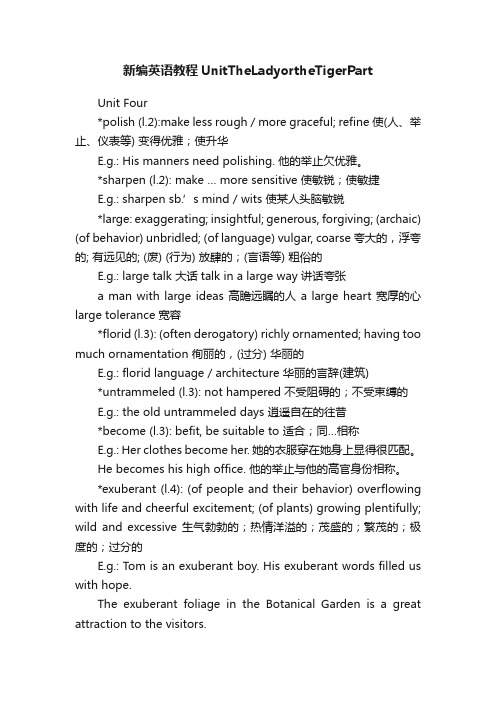
新编英语教程UnitTheLadyortheTigerPartUnit Four*polish (l.2):make less rough / more graceful; refine 使(人、举止、仪表等) 变得优雅;使升华E.g.: His manners need polishing. 他的举止欠优雅。
*sharpen (l.2): make … more sensitive 使敏锐;使敏捷E.g.: sharpen sb.’s mind / wits 使某人头脑敏锐*large: exaggerating; insightful; generous, forgiving; (archaic) (of behavior) unbridled; (of language) vulgar, coarse 夸大的,浮夸的; 有远见的; (废) (行为) 放肆的;(言语等) 粗俗的E.g.: large talk 大话talk in a large way 讲话夸张a man with large ideas 高瞻远瞩的人 a large heart 宽厚的心large tolerance 宽容*florid (l.3): (often derogatory) richly ornamented; having too much ornamentation 徇丽的,(过分) 华丽的E.g.: florid language / architecture 华丽的言辞(建筑)*untrammeled (l.3): not hampered 不受阻碍的;不受束缚的E.g.: the old untrammeled days 逍遥自在的往昔*become (l.3): befit, be suitable to 适合;同…相称E.g.: Her clothes become her. 她的衣服穿在她身上显得很匹配。
新编英语教程unit演示文稿

paragraph of a chapter • --read the conclusion , usually the final
• try to understand not only the details but the organization of the text while reading
• mark up the book in its marginal space by writing down my own thoughts and feeling about a certain idea or fact
because your eyes cannot move that quickly • Fast reading takes pleasure out of reading
b. reading strategies(more in word)
• mouth the words(vocalizing)
• look up every single new word (word-by-word reading)
•
c. tips for reading
• (1) Before starting to read: • read the contents page of the book • have a quick look at the chapter
carefully • Going back over just-read material improves
understanding • Comprehension decreases as rate increases • It is physically impossible to read rapidly
新编英语教程unit_10共27页文档
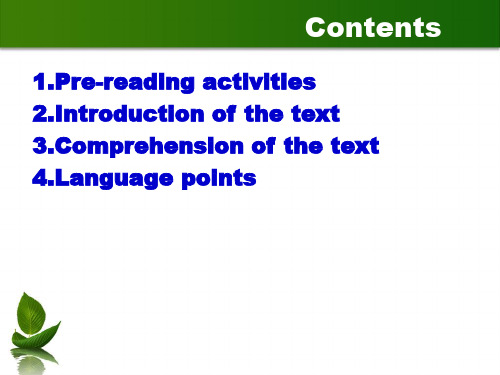
Spiritual music(原先由美国黑奴唱的)黑人圣歌, ballad 【音乐】 伤感的情歌:尤指浪漫的或伤感的流行歌曲, Swing music摇摆乐:形成于1935年前后的一种流行舞蹈音乐,以
爵士乐为基础,但运用更简单的和声和节奏形式以及更大的管乐队
美国黑人发展的流行音乐结合了福音唱诗以及强节奏音乐和布鲁斯音乐的特点?spiritualmusic原先由美国黑奴唱的黑人圣歌?ballad音乐伤感的情歌
Contents
1.Pre-reading activities 2.Introduction of the text prehension of the text nguage points
Aaron Copland (November 14, 1900 – December 2, 1990) was an American classical composer of concert and film music. Instrumental in forging a distinctly American style of composition, Copland's music achieved a difficult balance between modern music and American folk styles.
7.Mirror: v, reflect (sth) as in a mirror 反射,映照(某事物) Eg: The tress were mirrored in the still water of the lake. 静静的湖水映出岸上的树木。 A novel that mirrors modern society. 反映现实社会的小说
新编英语教程unit_10共27页文档

How many parts can this text be divided? How is it divided?
It can be divided into three parts: Paragraph 1-3: the composer Paragraph 4-7: the interpreter Paragraph 8-11: the listener
His work include billy the kid (1939),bury me mot on the lone prairie(1942), Appalachian spring(1944) and inscape(1967).
This text is an excerpt from a chapter in Copland’s what to listen for in music(1939).
诗以及强节奏音乐和布鲁斯音乐的特点),
Spiritual music(原先由美国黑奴唱的)黑人圣歌, ballad 【音乐】 伤感的情歌:尤指浪漫的或伤感的流行歌曲, Swing music摇摆乐:形成于1935年前后的一种流行舞蹈音乐,以
爵士乐为基础,但运用更简单的和声和节奏, country music, light music jazz, blues, heavy metal, rock, pop, folk, rap, sonata奏鸣曲, symphony, patriotic, religious, military Soul music (爵士灵歌:美国黑人发展的流行音乐,结合了福音唱
1.What’s the text about?
--This is an expository piece of writing, dealing with the relationship between the composer, interpreter and listener, the different role each plays in a musical experience.
新编英语教程unit 3

knack[næk]n.熟练技术, 诀窍, 巧妙的手法staggering['stag·ger·ing |adj.摇晃欲倒的; 巨大的; 惊人的; 难以相信的stagger[stag·ger |n.摇晃, 蹒跚; 交错安排; 晕倒症v.蹒跚而行; 畏缩; 犹豫, 动摇; 坚持进行;压倒plausible[plau·si·ble |adj.貌似真实的, 貌似有理的; 花言巧语的; 貌似可信的ineffable[in·ef·fa·ble |adj.无法形容的, 不应说出的, 说不出的be in awe of对 ... 望而生畏; 对 ... 感到害怕vestige[ves·tige |n.遗迹, 残余, 痕迹; 退化的器官recalcitrant[re'cal·ci·trant |adj.反抗的, 顽强的, 反对的; 难驾驭[管不了]的n. 反抗的人, 顽强者;无法管教的人surcease[sur·cease |v.使中止; 使停止; 中止; 停止n. 停止, 完结a house of cardsn. 纸牌做的房子, 不牢靠的计划elusive[e'lu·sive |adj.难懂的, 难捉摸的, 易忘的whimsical[whim·si·cal |adj.心情浮动的, 古怪的, 反覆无常的anecdote[an·ec·dote |n.轶事, 趣闻; 秘闻, 秘史carte blanche[‚kɑːt'blɒ0303;ːnʃ]全权委托; 署名空白纸plead with make an appeal to向…恳求awry[a·wry |adv.歪斜地;扭曲地[的] look ~adj. 脱离(路线)地[的]; (行动等)错误地[的],不顺遂地[的] go/run/tread~ prodigy[prod·i·gy |n.惊人的事物, 神童, 不凡的人infant/child podigy 神童不可思议之物; 壮观,奇观The podigies of nature 自然奇观dullard['dull·ard |n.愚人; 笨蛋stationary[sta·tion·ar·y |adj.不动的; 定居的; 不增减的; 常备军的n.固定物(驻军)abreast[a·breast |adv.并肩地; 并排地be [keep] abreast of [with] 与…并驾齐驱地be ~ of [with] the times = keep ~ of the times 与时代并进,不落伍patent[pat·ent |n.专利权, 专利品, 执照v.取得...的专利权, 请准专利adj.专利的, 新奇的, 显著的,明显的; 明白的fabulous['fab·u·lous |adj.传说的, 难以置信的, 惊人的; 非常的,无根据的;寓言般的; 想像中的offshootn.分支, 支流,支道,旁系collaborate[col·lab·o·rate |v.(两个以上的人)合作(with…on/in ); 通敌,勾结prey[preɪ]n.被掠食者, 牺牲者v.捕食, 折磨, 掠夺;使 ... 苦恼quaint[kweɪnt]adj.古雅的, 奇怪的, 离奇有趣的twirl[twɜrl ]n.旋转; 捻弄; 转动; 旋转的东西v.快速转动, 捻弄; 转动, 旋转inward[in·ward || 'ɪnwə(r)d]n.内部, 里面; 肠胃; 内脏adj.内心的, 本来的, 向内的adv.向内; 在内furrow[fur·row |n.犁沟; 皱纹v.犁; 弄绉; 耕; 犁田; 形成车辙; 开沟; 犁出浪迹placid[plac·id |adj.平静的, 平稳的, 沉著的fathom[fæðəm|n.深度单位; 推测v.测量深度; 彻底了解; 看穿haggard| 'hægə(r)d]n.野鹰adj.憔悴的, 野性的, 形容枯槁的grief[grɪːf]grief-linedn.悲痛; 不幸; 伤心事grope[grəʊp]v.触摸; 探索, 探求; 暗中摸; 摸索; 抚摸...的身体groping adj. 摸索的; 暗中摸索的steer[stɪr /stɪə]n.指点, 建议#小公牛; 食用牛; 阉牛v.掌舵, 驾驶; 带领; 指导; 操纵; 被驾驶, 驾驶起来; 行驶, 行进duet| djuː'et]n.二重唱; 二重奏reveal| rɪ'vɪːl]v.露出, 透露, 显示agitate[ag·i·tate || 'ædʒɪteɪt]v.使激动; 搅动; 使焦虑; 摇动; 鼓动; 煽动wiggle| 'wɪgl]n.踌躇, 摆动pier[pɪr /pɪə]n.码头, 防波堤, 桥墩generate| 'dʒenəreɪt]v.产生, 导致, 发生; 衍生; 形成tumble[tum·ble || 'tʌmbl] ~ downn.跌跤; 倒塌; 坠落; 暴跌v.翻倒, 倒塌, 摔倒; 使摔倒, 弄乱, 使滚翻ineloquent inˋєləkwənt]adj.不善言辞的, 无口才的turmoil[tur·moil || 'tɜrmɔɪl /'tɜː-]n.骚动, 混乱in a ~revolutionary[,rev·o'lu·tion·ar·y || ‚revə'luːʃnərɪ] n.革命者, 改革者adj.革命的, 革命性的radicalquantum[quan·tum || 'kwɑntəm /'kwɒ-]n.分配量, 量, 额serenity[se·ren·i·ty || sə'renətɪ]n.晴朗, 风和日丽; 尊贵的阁下; 平静, 沉着your Serenity 殿下confiscate[con·fis·cate || 'kɒnfɪskeɪt]v.没收; 查抄; 充公heed[hɪːd]n.注意, 留心v.留心, 注意~ sth/ give (pay) ~ to/take (no) ~ of agony['ag·o·ny || 'ægənaɪz]n.极度痛苦; 临死的痛苦; 苦恼; 爆发in ~ 痛苦的,苦闷的final ~ 他垂死的挣扎n an ~ of joy 狂喜的,大喜的the ~ of war 战争的惨烈scarf[skɑrf /skɑːf]n.围巾; 头巾; 披巾; 领巾#嵌接; 槽; 斜面, 截面, 切口akin[a·kin || ə'kɪn] (to)adj.血族的, 同种的, 同族的cosmic[cos·mic || 'kɒzmɪk(l)]adj.宇宙的, 有秩序的, 宇宙论的;广大无边的; 秩序井然的; 和谐的ceaseless['cease·less || 'sɪːslɪs]adj.不停的, 不断的nerve[nɜrv /nɜːv]n.神经; 忧虑, 焦躁; 神经过敏; 勇敢, 胆量v.鼓起勇气nerves神经过敏(的状态) ,神经质; 胆怯; 焦虑神经过敏症,歇斯底里症[又作a ~] 厚脸皮,无耻,冒失What (a) ~!.厚脸皮!delusion[de·lu·sion || dɪ'luːʒn]n.迷惑, 错觉, 欺瞒grandeur[gran·deur || 'grændʒə(r)]n.庄严; 伟大;崇高,庄严conceit[con·ceit || kən'siːt]n.自负, 狂妄, 空想roll intov. 滚进, 卷成, 使合为一体=mix thoroughly; mingle together搅匀;拌和conversationalist[,con·ver'sa·tion·al·ist || ‚kɑnvə(r)'seɪʃnəlɪst /kɒn-] n.健谈者, 交谈者, 爱交谈的人, 口才好的人maddeningly['mædnɪŋlɪ]adv.令人发狂地; 狂暴地; 狂怒地mania[ma·ni·a || 'meɪnjə]n.狂躁, 狂热, 热衷trivial['triv·i·al || 'trɪvɪəl]adj.琐细的, 微不足道的, 价值不高的harangue[ha·rangue || hə'ræŋ]n.高谈阔论, 热烈的演说v.滔滔不绝地演讲volubility[vol·u·bil·i·ty || ‚vɑljə'bɪlətɪ/‚vɒljʊ'b-]n.健谈; 口若悬河with ~stun[stʌn]v.使晕倒, 打晕, 使惊吓n.晕眩, 惊倒, 打昏pamphlet[pam·phlet || 'pæmflɪt]n.小册子,宣传小册applause[ap·plause || ə'plɔːz]n.欢呼; 鼓掌欢迎eminent[em·i·nent || 'emɪnənt]adj.显赫的; 有名的; 杰出的vocalist['vo·cal·ist || 'vəʊkəlɪst]n.声乐家, 歌手rave[reɪv]n.胡言乱语; 呼啸, 咆哮; 狂骂; 热烈赞美v.胡言乱语; 激烈地说; 狂骂; 狂热赞扬, 极力夸奖; adj.赞扬的stamp[stæmp]n.邮票; 印花; 图章, 印v.贴邮票于; 盖章于; 压印于;跺脚; 拒绝, 毁掉, 扑灭; 踩; 捣碎callous[cal·lous || 'kæləs]adj.麻木的, 坚硬的, 无情的v.使硬结, 使麻木; 变硬, 结茧; 变得冷酷无情grovel[grov·el || 'grɑvl ,'grʌvl /'grɒvl]v.趴; 卑躬屈膝; 匍匐recipient[re·cip·i·ent || rɪ'sɪpɪənt]n.接受者; 接受器, 容器; 受领者; 间接宾语unscrupulous/ʌnˈskruː.pjʊ.ləs/adj.无道德的, 狂妄的, 不谨慎的infidelity[in·fi·del·i·ty || ‚ɪnfɪ'delətɪ]n.不信神, 背信, 无信仰,不忠诚mortal[mor·tal || 'mɔrtl /'mɔːtl]n.凡人; 人类adj.不免一死的, 临终的, 人类的burlesque[bur·lesque || bɜː'lesk]n.作戏, 滑稽戏v.模仿; 取笑libretto[li·bret·to || lɪ'bretəʊ]n.歌词集, 歌词testimony['tes·ti·mo·ny || 'testɪməʊnɪ/-mənɪ]n.证言, 声明, 证据bear ~ to 为…作证stupendous[stu·pen·dous || stuː'pendəs /-tju-]adj.惊人的, 巨大的span[spæn]n.墩距; 一段时间; 跨度; 指距, 一叉宽#跨绳v.横跨, 跨越; 在...上建拱门; 在...架桥; 以指距量; 套上caricature[car·i·ca·ture || 'kærɪkə‚tjʊə]n.讽刺画; 讽刺描述法; 漫画v.画成漫画讽刺atonement[a'tone·ment || -mənt]n.补偿, 赎罪, 赔偿make ~ fortrilogy[tril·o·gy || 'trɪlədʒɪ]n.三部剧, 三部曲downright/ˈdaʊn.raɪt/adj.明白的, 显明的, 率直的dumb[dʌm]adj.哑的, 无声音的, 不说话的be dumb with….claw[klɔː]n.爪, 抓伤, 钩v.用爪子抓; 费力地夺回; 用爪子抓shriek[ʃrɪːk]n.尖叫, 尖声喊叫, 尖声v.尖叫, 发出尖锐的声音; 尖声发出。
新编英语教程1_Unit_1_language_work
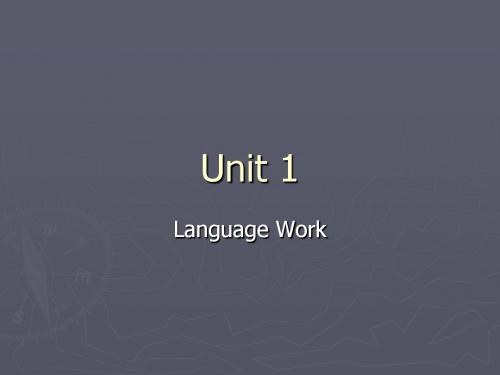
I wish I had been there with you this time: see Notes Things like that: (and we did) other things of that kind
►
I had a similar experience: experience means something that happens to one and has an effect on the mind and feelings. It‟s a countable noun.
e.g. a chess tournament a basketball tournament
►
►
bodybuilding exercises: exercises to build up health shadowboxing: 太极拳
► ►
VCD: video compact disc on: about
►
impress v. have a strong influence on; fix deeply (on the mind, memory)
e.g. I was greatly impressed by the film. The book did not impress me at all.
►
search v. to look at, examine or go over (a thing or place) carefully to find sb./sth.
e.g. The policemen searched the house. The customer was searched by the inn keeper. The man searched the pocket for the key.
新编英语教程(修订版)第1单元课件

convince: to make sb complete certain about sth; persuade; convince sb that *They failed to convince the directors that their proposal would work. *I am convinced by your story. convince sb of sth *We finally convinced them of our innocence. convince sb to do sth *I‟ve been trying to convince Jean to come with us.
peer at – to look very carefully or hard, esp. as if not able to see clearly peek at – to take a quick look at something when one should not *The children were peeking behind from the wall. peep at – to look at something quickly and secretly, esp. through a hole or other small opening *I caught him peeping through the keyhole.
The Present Perfect
In a sentence beginning with “ This is the first/second… time”, the verb in the subordinate clause is in the present perfect form. e.g. *This is the first time I‟ve been in Xi‟an. *This is the second time I‟ve seen this film.
- 1、下载文档前请自行甄别文档内容的完整性,平台不提供额外的编辑、内容补充、找答案等附加服务。
- 2、"仅部分预览"的文档,不可在线预览部分如存在完整性等问题,可反馈申请退款(可完整预览的文档不适用该条件!)。
- 3、如文档侵犯您的权益,请联系客服反馈,我们会尽快为您处理(人工客服工作时间:9:00-18:30)。
check quickly whether a text you are reading contains
and metaphor; • Composition writing— argumentation; • Letter writing—regretting having missed
seeing a friend
Text I l Pre-reading activities
• What’s the difference between read between the lines and write between the lines?
• - write between the lines: not a set phrase, a piece of good advice on how to “read” efficiently, read is replaced with write to stress the importance of writing notes and comments one is reading
• go back over just-read material (regressing)
• try to use the context to work out the meaning of unfamiliar words
• mentally translate everything
• predict the content of the text on the basis of headings,ces
paragraph of a chapter • --read very quickly, skip or leave out small
portions of the material in order to get the main ideas • •
c. tips for reading
• Scanning is a reading skill you use when you want to
you want to get the main idea of a book • --read the introduction, usually the opening
paragraph of a chapter • --read the conclusion , usually the final
headings • have a glance at the Index which is
helpful for specific information
c. tips for reading
• (2) Skimming and scanning: • Skimming is a reading skill you use when
• try to understand not only the details but the organization of the text while reading
• mark up the book in its marginal space by writing down my own thoughts and feeling about a certain idea or fact
新编英语教程unit
l Detailed sCtudoynotf eTenxttsI & II
l Oral work: • Role-play: buying a dictionary; • Interaction activities: the way I do my reading l Guided writing: • Basic writing techniques—comparison, simile,
• look up every single new word (word-by-word reading)
•
c. tips for reading
• (1) Before starting to read: • read the contents page of the book • have a quick look at the chapter
carefully • Going back over just-read material improves
understanding • Comprehension decreases as rate increases • It is physically impossible to read rapidly
l While-reading activities
• Discussion: How do you read? • a. myths and misconceptions about reading • Concentrating on each word in print aids
comprehension and memory • The only way to read anything is slowly and
because your eyes cannot move that quickly • Fast reading takes pleasure out of reading
b. reading strategies(more in word)
• mouth the words(vocalizing)
